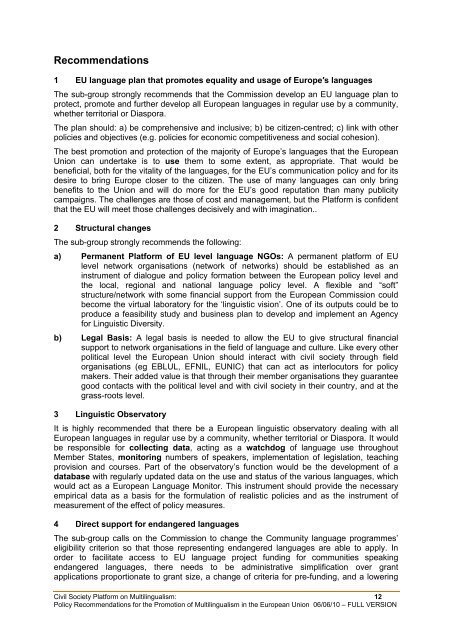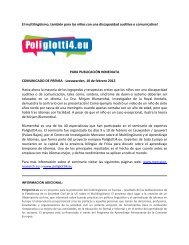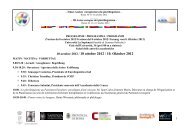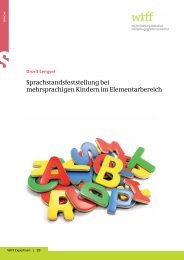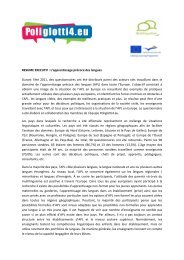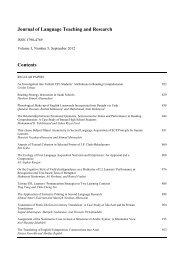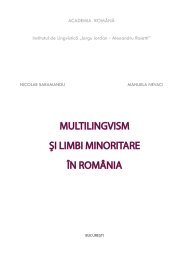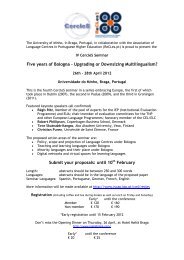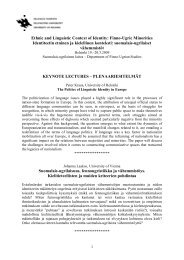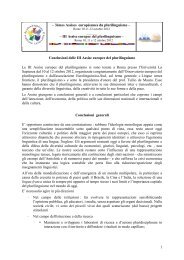FULL VERSION - European Commission - Europa
FULL VERSION - European Commission - Europa
FULL VERSION - European Commission - Europa
Create successful ePaper yourself
Turn your PDF publications into a flip-book with our unique Google optimized e-Paper software.
Recommendations1 EU language plan that promotes equality and usage of Europe′s languagesThe sub-group strongly recommends that the <strong>Commission</strong> develop an EU language plan toprotect, promote and further develop all <strong>European</strong> languages in regular use by a community,whether territorial or Diaspora.The plan should: a) be comprehensive and inclusive; b) be citizen-centred; c) link with otherpolicies and objectives (e.g. policies for economic competitiveness and social cohesion).The best promotion and protection of the majority of Europe’s languages that the <strong>European</strong>Union can undertake is to use them to some extent, as appropriate. That would bebeneficial, both for the vitality of the languages, for the EU’s communication policy and for itsdesire to bring Europe closer to the citizen. The use of many languages can only bringbenefits to the Union and will do more for the EU’s good reputation than many publicitycampaigns. The challenges are those of cost and management, but the Platform is confidentthat the EU will meet those challenges decisively and with imagination..2 Structural changesThe sub-group strongly recommends the following:a) Permanent Platform of EU level language NGOs: A permanent platform of EUlevel network organisations (network of networks) should be established as aninstrument of dialogue and policy formation between the <strong>European</strong> policy level andthe local, regional and national language policy level. A flexible and “soft”structure/network with some financial support from the <strong>European</strong> <strong>Commission</strong> couldbecome the virtual laboratory for the ‘linguistic vision’. One of its outputs could be toproduce a feasibility study and business plan to develop and implement an Agencyfor Linguistic Diversity.b) Legal Basis: A legal basis is needed to allow the EU to give structural financialsupport to network organisations in the field of language and culture. Like every otherpolitical level the <strong>European</strong> Union should interact with civil society through fieldorganisations (eg EBLUL, EFNIL, EUNIC) that can act as interlocutors for policymakers. Their added value is that through their member organisations they guaranteegood contacts with the political level and with civil society in their country, and at thegrass-roots level.3 Linguistic ObservatoryIt is highly recommended that there be a <strong>European</strong> linguistic observatory dealing with all<strong>European</strong> languages in regular use by a community, whether territorial or Diaspora. It wouldbe responsible for collecting data, acting as a watchdog of language use throughoutMember States, monitoring numbers of speakers, implementation of legislation, teachingprovision and courses. Part of the observatory’s function would be the development of adatabase with regularly updated data on the use and status of the various languages, whichwould act as a <strong>European</strong> Language Monitor. This instrument should provide the necessaryempirical data as a basis for the formulation of realistic policies and as the instrument ofmeasurement of the effect of policy measures.4 Direct support for endangered languagesThe sub-group calls on the <strong>Commission</strong> to change the Community language programmes’eligibility criterion so that those representing endangered languages are able to apply. Inorder to facilitate access to EU language project funding for communities speakingendangered languages, there needs to be administrative simplification over grantapplications proportionate to grant size, a change of criteria for pre-funding, and a loweringCivil Society Platform on Multilingualism: 12Policy Recommendations for the Promotion of Multilingualism in the <strong>European</strong> Union 06/06/10 – <strong>FULL</strong> <strong>VERSION</strong>


